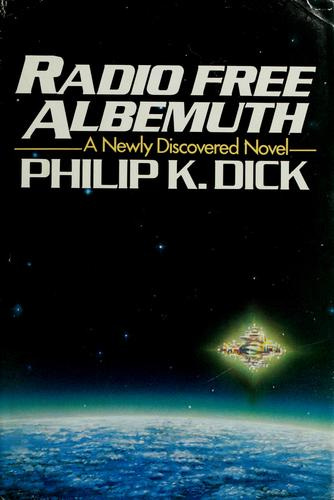Visiting Austin, Texas for the first time
some thoughts on LBJ, the Great Society, the Veil of Ignorance, PKD, and Doris Kearns Goodwin
Even though Austin, the capital of Texas, is a cultural outlier, the dread of laying my foot on the soil of "Texas," the land of Ted Cruz and Greg Abbott, probably lingered in the back of my mind and subtly influenced my touristic interest throughout the short visit.
On the plane ride to Austin, I was reading Adam Gopnik's review of some books on liberalism and its struggles in this era, and I learned about a useful idea called the "Veil of Ignorance," something that is so obvious once we learn about it. In a nutshell:
"Rawls devised one of the most powerful of all thought experiments: the idea of the 'veil of ignorance,' behind which we must imagine the society we would want to live in without knowing which role in that society’s hierarchy we would occupy. Simple as it is, it has ever-arresting force, making it clear that, behind this veil, rational and self-interested people would never design a society like that of, say, the slave states of the American South, given that, dropped into it at random, they could very well be enslaved. It also suggests that Norway might be a fairly just place, because a person would almost certainly land in a comfortable and secure middle-class life, however boringly Norwegian." (Quoted from The New Yorker1)
(SR: I find that John Rawls was an influential political philosopher whose 1971 book "A Theory of Justice" is about fairness, which revolves around the "liberty principle" and the "difference principle.")
Then we visited the State Capitol and the LBJ Library & Museum where I finally verified the majesty of the archive as the LBJ biographer Robert Caro so vividly describes in the pages of his memoir “Working”2.

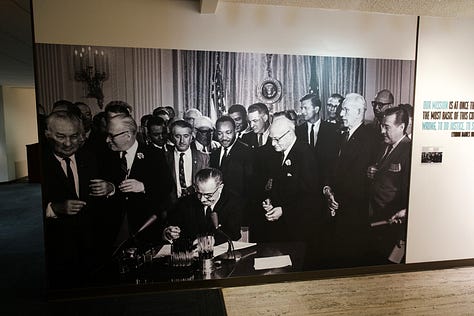

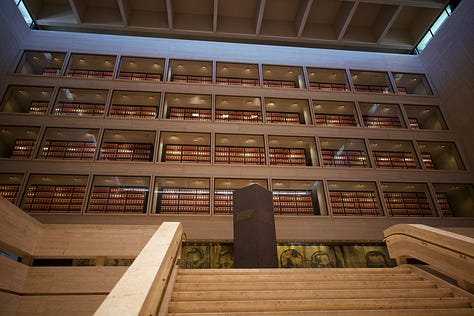
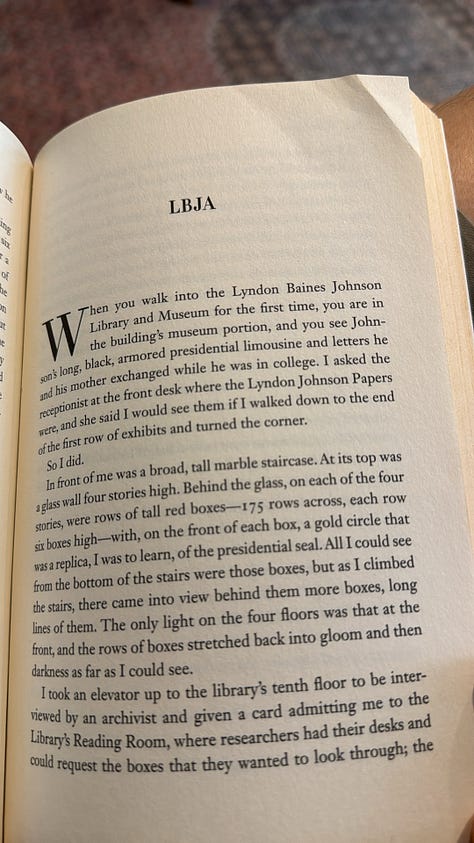
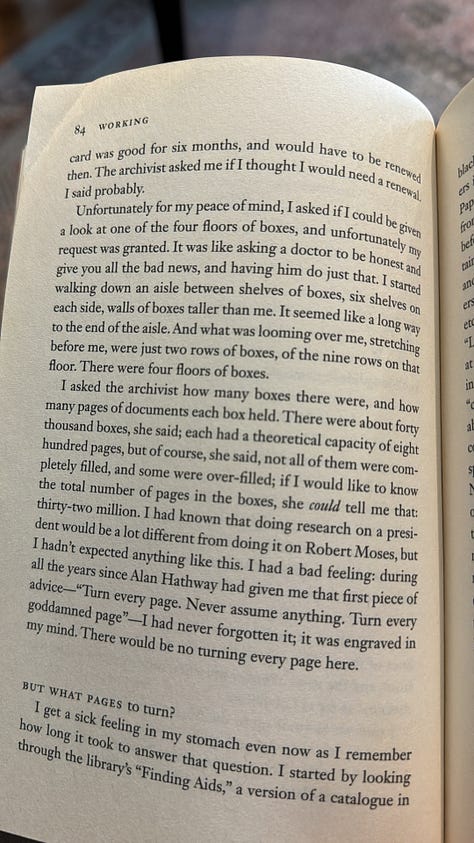
Earlier in my career, I had an experimental physicist colleague next to my office who prominently displayed a black-and-white portrait of LBJ, not Einstein or Rutherford, on his wall. I found this rather strange at the time. As an ‘excuse’, he mumbled that even though LBJ gets much flack over Vietnam, he did a lot of good; he was a complex man. After decades having lived in this country, I appreciate his sentiment and would agree with his conflicted admiration for the president. The long array of fountain pens (picture above) that LBJ used to sign numerous laws into action speaks volumes about the ‘Yang’-side of his legacy.
On the second day, we went to a charming bookstore called BookPeople, which is impressively well-stocked and still retains the character of a local bookstore. There, I found and picked up a novel titled "Radio Free Albemuth" by Philip K. Dick. It turns out this lesser-known novel3 was the posthumously published precursor to the mind-bending "VALIS," and like many of his prophetic stories, it reinforces his reputation as the man from the future. The plot features an alternate history premise: after LBJ, the US got a paranoid, fear-mongering, and divisive dictator who uses a non-existent and ‘ubiquitous’ organization ('Aramchek') and a populist movement “Friends of the American People” (FAPers) to turn the country into a den of fearful and suspicious informers. Eerily prescient - Deep State, MAGA, QAnon? - and chilling, especially in this pivotal year of election.
Back at home, we caught up on what we missed on TV during the travel. Here, I found a fitting closure on the theme of the Great Society: Doris Kearns Goodwin, the eminent presidential historian, talking about her newly released memoir4. She talks about her relationship with LBJ, 'The Great Society,' and Vietnam. The main subject of her latest book5 is her late husband, Dick Goodwin, who was a speechwriter and architect of policies for JFK and LBJ. Out of retirement, he also wrote Al Gore's now-famous concession speech. Impressive phrases such as "we shall overcome" and "the Great Society" came from him (and maybe Bill Moyers, the aide to the president at the time, too?).
Now, PBS and NPR, home to shows like this, exist thanks to one of those LBJ signatures, but their continued existence has come under increasing threat from right-wing lawmakers. Even more gravely, the civil and gender rights laws that took decades to enact face the risk of crumbling overnight. Notwithstanding the historian’s reassurance, isn’t it universally acknowledged that it only takes a blink to destroy something built over eons, not the other way around?
“Why Liberals Struggle to Defend Liberalism” | Adam Gopnik, https://www.newyorker.com/magazine/2024/05/27/why-liberals-struggle-to-defend-liberalism
https://www.nytimes.com/2019/04/09/books/review-working-robert-caro.html
https://en.wikipedia.org/wiki/Radio_Free_Albemuth
Her answer to the NYT’s “by the book interview” question: You’re organizing a dinner party. Which three storytellers, dead or alive, do you invite? - “Lincoln, F.D.R. and L.B.J. I know what they liked to drink and eat. So I would serve water, oyster stew and chicken fricassee with biscuits for Lincoln; martinis and hot dogs with all the fixings for F.D.R.; and Cutty Sark Scotch, chicken fried steak and mashed potatoes for L.B.J. And for once I would keep my mouth shut and listen to three of the most entertaining and enlightening storytellers America has ever produced.”
“An Unfinished Love Story: A Personal History of the 1960s” | Doris Kearns Goodwin, https://a.co/d/apes2Ag


